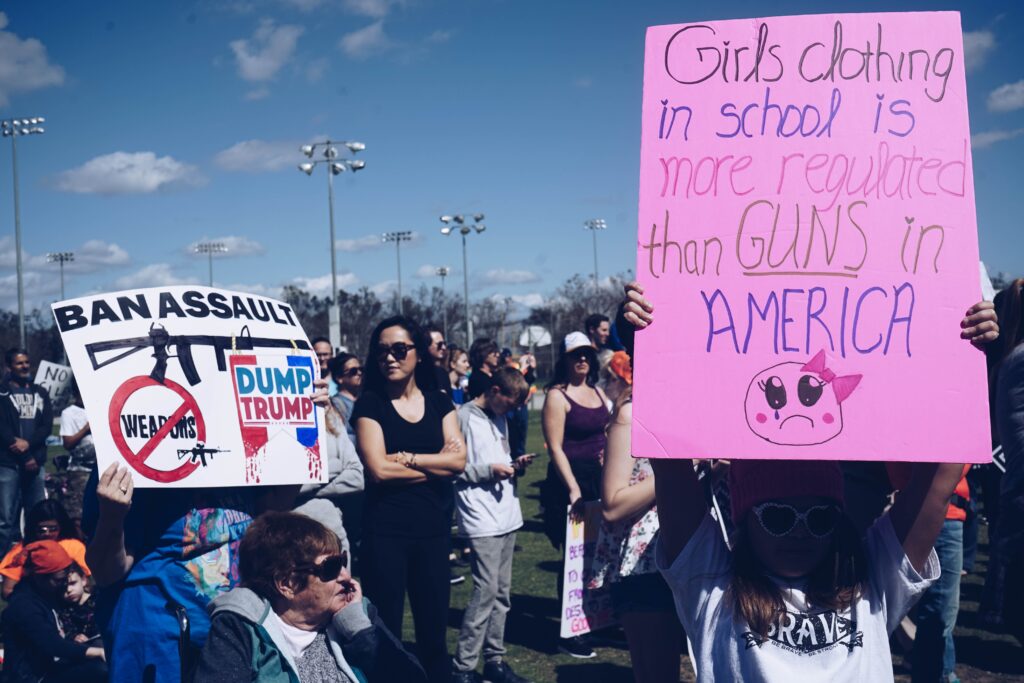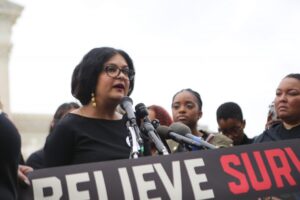
by Nadiah Mohajir
It’s time to talk about toxic masculinity and how it is killing our communities, especially our women and girls. Early Thanksgiving week, Mercy Hospital in Chicago suffered a mass shooting, where one of their Emergency Medicine doctors, Dr. Tamara O’Neal, was shot multiple times by her ex-fiance, Juan Lopez. Later, Juan Lopez continued firing, when a few others, including a police officer and pharmacist, also suffered fatal gunshot wounds. Only a few weeks before, Dr. O’Neal and her ex-fiance had planned to be married, but she had called off the wedding. Media is reporting that her Lopez had followed her to work, demanding that she return the engagement ring.
Unfortunately, this incident is not unlike other mass shootings: what began as a domestic violence dispute turned into a multiple homicide, a disturbing pattern anti-violence advocates have been trying to raise awareness about for years. In fact, according to Everytown for Gun Safety, more than half – fifty four percent – of shootings with four or more casualties are related to domestic violence. From Omar Mateen who shot a nightclub in Orlando to Parkland shooter Nikolas Cruz, this correlation doesn’t just remain a mere made up statistic, but continues to be proven with each recurring report of mass shootings.
And yet, despite decades of anti-violence advocacy and push for policy change and stricter gun laws, little change remains to be seen. Admittedly, while gun reform and policy change could offer some immediate relief, it is time to examine the root cause of this type of gender-based violence: attitudes of toxic masculinity that dehumanize women and generate a sense of entitlement toward their bodies. These attitudes are often the reason women do not leave abusive relationships, for fear of their physical safety. Put differently, sometimes not leaving is actually the safer option. In fact, a recent United Nations study just found that more than half of female murder victims were killed by their partners, arguing that home might actually be the most dangerous place for women.
It’s time to address this epidemic that is killing too many of our women and girls and make a collective commitment to create a culture shift that promotes safe, healthy, and equitable relationships. Much of this work can begin at home and in schools, starting with boys as young as three. Here are a few tips to help you begin.
Teach boys (and men) consent. It is crucial for all individuals to know the definition of consent, under which conditions it is not valid, and most importantly, how to cope with rejection. Continue these conversations using developmentally-appropriate language and examples throughout childhood and adolescence. Often, parents think about consent in the context of sexual relationships. However, consent can be taught using everyday examples that have nothing to do with sex and intimacy. Whether it’s to get permission to give someone a high five, or to take their photo, or to stop tickling, young people need to learn the value of getting (and respecting) consent. Finally, along with consent, discuss the disappointment one might feel if they do not receive consent, and ways that they can cope with those feelings.
Normalize mental well-being and counseling. Too often, couples experience relationship issues but are not open to therapy and counseling. Seeking therapy and counseling continue to remain stigmatized, and males often receive messaging that counseling is for the “weak.” Encourage counseling, and for younger boys, encourage them to express their feelings through talking it out and showing emotion. Do not humiliate them for crying or expressing frustration or disappointment.
Challenge rape culture in conversations around you, and in movies and media. Speak up, and speak loud when you hear jokes about rape or others speaking about women in a way that objectifies them. Remaining silent enables this kind of toxicity to perpetuate and normalizes misogynist attitudes toward women. Moreover, acknowledge toxic messaging in movies and media, and use it as a teaching moment with young people.
Shift the burden of responsibility for prevention from women. For too long, the burden of preventing violence from happening has been on the victims. If only they didn’t provoke him, or dress like that, it wouldn’t have happened. If only they had taken self defense classes or filed a police report, it wouldn’t have happened. Asking why she didn’t leave is not only not productive and a form of victim blaming, but deflects accountability from the abuser and their crimes. Don’t ask her why she didn’t leave earlier; rather, understand the barriers to leaving and work to reduce those barriers so that it becomes easier to safely leave a relationship.
Do not accept double standards of accountability. The culture of “boys will be boys” is a function of social conditioning, and not human nature. This concept reinforces the idea that certain behaviors from boys are expected and that males are inherently violent, aggressive, promiscuous, and sexist. Do not accept situations that ignore male bad behavior and reject the idea that boys are supposed to be this way. Work to create systems that promote gender equity and systems of accountability.
Believe victims. Last but certainly not least, believe victims. How often have we asked why didn’t she say something before, only to find out that she actually did, but no one believed her? How many accounts have we heard of perpetrators abusing for decades, and many of the earlier victims tried to tell someone about it, only to be silenced? Understand that coming forward is a courageous step for victims, and helping them get to safety should be the utmost priority.
Dr. Tamara O’Neal took all the steps society tells victims to take: she left an abusive relationship. Unfortunately, that turned out to be the most unsafe option for her because Juan Lopez felt an entitlement to her body even after she took her agency back. We can no longer afford to wait for gun reform or better safety planning services to save our women and girls from intimate partner violence. While those changes are necessary and long overdue, they are a bandaid to the larger problem that promotes and encourages violence against women. Changing that culture begins at home.
Learn more:
We are Man Enough Facebook Web Series by Justin Baldoni
 Good afternoon. My name is Qudsia Raja, and I’m speaking today as a survivor, as an advocate, and as a board member of Collective Action for Safe Spaces (CASS), an organization working to make DC safer for everyone by using comprehensive, community-based solutions through an intersectional lens to eliminate public gendered harassment and assault in the DC metropolitan area.
Good afternoon. My name is Qudsia Raja, and I’m speaking today as a survivor, as an advocate, and as a board member of Collective Action for Safe Spaces (CASS), an organization working to make DC safer for everyone by using comprehensive, community-based solutions through an intersectional lens to eliminate public gendered harassment and assault in the DC metropolitan area. by Rafia Khader
by Rafia Khader
